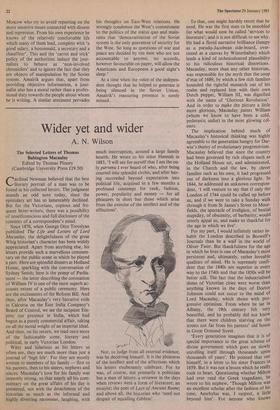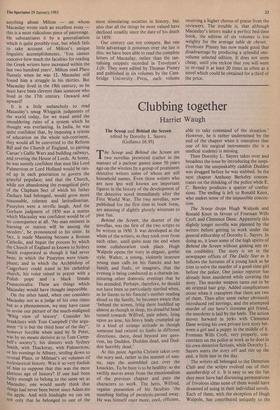Wider yet and wider
A. N. Wilson
The Selected Letters of Thomas Babington Macaulay Edited by Thomas Pinney (Cambridge University Press £19.50) Ciardinal Newman believed that the best literary portrait of a man was to be found in his collected letters. The judgment sounds an odd note today, since the epistolary art has so lamentably declined. But for the Victorians, copious and fre- quent letter-writers, there was a possibility of unselfconscious and full disclosure of the contents of a correspondent's mind.
Since 1876, when George Otto Trevelyan published The Life and Letters of Lord Macaulay, the delightfulness of the great Whig historian's character has been widely appreciated. Apart from anything else, his letters provide such a marvellous commen- tary on the public scene in which he played a part. Here are splendid dinners at Holland House, sparkling with the conversation of Sydney Smith; here is the pomp of Parlia- ment — the letter describing the coronation of William IV is one of the most superb ac- counts extant of a public ceremony. Here are the excitements of the Reform Bill. And then, after Macaulay's very lucrative exile in Calcutta on the East India Company's Board of Control, we see the incipient Em- pire; our presence in India, which had begun as a purely commercial affair, taking on all the moral weight of an imperial ideal. And then, on his return, we read once more of the fashionable scene, literary and political, in early Victorian London.
Witty and hilarious as his letters so often are, they are much more than just a journal of 'high life'. For they are mostly written to members of his family — first to his parents, then to his sisters, nephews and nieces. Macaulay's love for his family was intensely strong, so that nearly all his com- mentary on the great affairs of his day is presented, not with the detachment of the historian so much as the informal and highly diverting raconteur, laughing, with much interruption, around a large family hearth. He wrote to his sister Hannah in 1883, 'I will say for myself that I am the on- ly parvenu I ever heard of who, after being courted into splendid circles, and after hav- ing succeeded beyond expectation into political life, acquired in a few months a profound contempt for rank, fashion, power, popularity and money — for all pleasures in short but those which arise from the exercise of the intellect and of the affections'.
Nor, to judge from all external evidence, was he deceiving himself. It is the pleasures of the intellect and of the affections which his letters exuberantly celebrate. For he was, of course, not primarily a politician but a man of letters: a reviewer in the days when reviews were a form of literature; an essayist; the poet of Lays of Ancient Rome; and above all, the historian who 'need not despair of equalling Gibbon'.
To that, one might harshly retort that he need. He was the first man to be ennobled for what would now be called 'services to literature'; and it is not difficult to see why. He had a florid narrative brilliance (lumpy as a pseudo-Jacobean side-board, over- tinted as a canvas by Winterhalter) which lends a kind of technicoloured plausibility to his ridiculous historical distortions. Macaulay, more than any other historian, was responsible for the myth that the coup d'etat of 1689, by which a few rich families hounded the rightful monarch out of his realm and replaced him with their own Dutch puppet, William III, was dignified with the name of 'Glorious Revolution'. And in order to make the picture a little more glorious, Macaulay paints William (whom we know to have been a cold, pederastic sadist) in the most glowing col- ours.
The implication behind much of Macaulay's historical thinking was highly agreeable to the generation hungry for Dar- win's theory of evolutionary progressivism. Macaulay believed that since the country had been governed by rich cliques such as the Holland House set, and administered, in the Church and the law, by clever families such as his own, it had progressed out of darkness into a glorious light. In 1844, he addressed an unknown correspon- dent, 'I will venture to say that if only the London of 1744 could be called up before us, and if we were to take a Sunday walk through it from St James's Street to Moor- fields, the spectacle of irreligion, of bestial stupidity, of obscenity, of barbarity, would utterly appal us, and make us thankful for the age in which we live'.
For my part, I would infinitely rather in- habit the London described in Boswell's Journals than be a waif in the world of Oliver Twist. But thankfulness for the age in which he lives is one of Macaulay's most persistent and, ultimately, rather loveable qualities of mind. He is supremely confi- dent that the 1840s are superior in every way to the 1740s and that the 1850s will be better still. The fact that the industrialised slums of Victorian cities were worse than, anything known in the days of Doctor Johnson could not occur to the mind of Lord Macaulay, which shone with pro- gressive optimism. From where he sat in Albany, the 19th century felt very beautiful, and he probably did not know that there were children starving on the streets not far from his parents' old house in Great Ormond Street.
'Every generation imagines that it is of special importance in the great scheme of divine government which goes on slowly unrolling itself through thousands upon thousands of years'. He pointed that out himself, in a letter to his sister Frances in 1859. But it was not a lesson which he really took to heart. Questioning whether Milton had ever read the Greek tragedians, he wrote to his nephew, 'Though Milton was an excellent scholar after the fashion of his time, Aeschylus was, I suspect, a little beyond him'. For anyone who knows anything about Milton — on whom Macaulay wrote such an excellent essay this is a most ridiculous piece of patronage. He substantiates it by a generalisation which is quite possibly true, but which fails to take account of Milton's unique linguistic accomplishments. You cannot conceive how much the faculties for reading the Greek writers have increased within the last two hundred years'. Milton read Plato fluently when he was 12. Macaulay still found him a struggle in his thirties. But Macaulay lived in the 19th century, so he must have been cleverer than someone who lived in the 17th century. Onward and upward!
It is a little melancholy to read Macaulay's smug Whiggish judgments of the world today, for we stand amid the smouldering ruins of a system which he thought was everlasting. In India, he was quite confident that, by imposing a system of education on the whole sub-continent, they would all be converted to the Reform Bill and the Church of England, to parsing Caesar's Gallic Wars and building railways, and revering the House of Lords. At home, he was sunnily confident that men like Lord Palmerston or Lord Holland would be rais- ed up in each generation to govern the grateful populace; and that the Church, while not abandoning the evangelical piety of the Clapham Sect of which his father Zachary had belonged, would grow more reasonable, tolerant and latitudinarian. Puseyites were a terrific laugh. And the Gorham judgment of 1850 was a matter which Macaulay was confident would be of no consequence at all. 'No man eminent in learning or station will be among the seceders', he pronounced to his sister. In fact, it made Manning become a Roman Catholic, and began the process by which the Church of England as known to Sydney Smith evaporated as though it had never been; in which the Puseyites were trium- phant; and in which the Archbishop of Canterbury could stand in his cathedral church, his voice raised in prayer with a Polish pope and a black female Pentecostalist. These are things which Macaulay would have thought impossible.
On the other hand, when one considers Macaulay not as a judge of his own times but as a phenomenon, we may have cause to revise our picture of the much-maligned 'Whig view of history'. Consider his breakfasts with Tom Campbell (`the argu- ment "it is but the third hour of the day", however forcible when used by St Peter, was by no means decisive as to Tom Camp- bell's society'); his dinners with Sydney Smith, with Thackeray, with Palmerston; or his evenings in Albany, settling down to re-read Plato, or Milman's six volumes of ecclesiastical history. Was it so very foolish of him to suppose that this was the most glorious age of history? If one had been lucky enough to belong to the same set as Macaulay, one would surely think that things had never been better since Adam ate the apple. And with hindsight we can see uot only that he belonged to one of the most stimulating societies in history, but also that all the things he most valued have declined steadily since the date of his death in 1859.
Our century can not compete. But one little advantage it possesses over the last is this: we have been able to read the complete letters of Macaulay, rather than the tan- talising snippets recorded in Trevelyan's Life. They were edited by Thomas Pinney and published in six volumes by the Cam- bridge University Press, each volume receiving a higher chorus of praise from the reviewers. The trouble is, that although Macaulay's letters make a perfect bed-time book, the edition of six volumes is too weighty for the average table de chevet. Professor Pinney has now made good that disadvantage by producing a splendid one- volume selected edition. It does not seem cheap, until you reckon that you will want to re-read it at least 20 times as often as a novel which could be obtained for a third of the price.







































 Previous page
Previous page